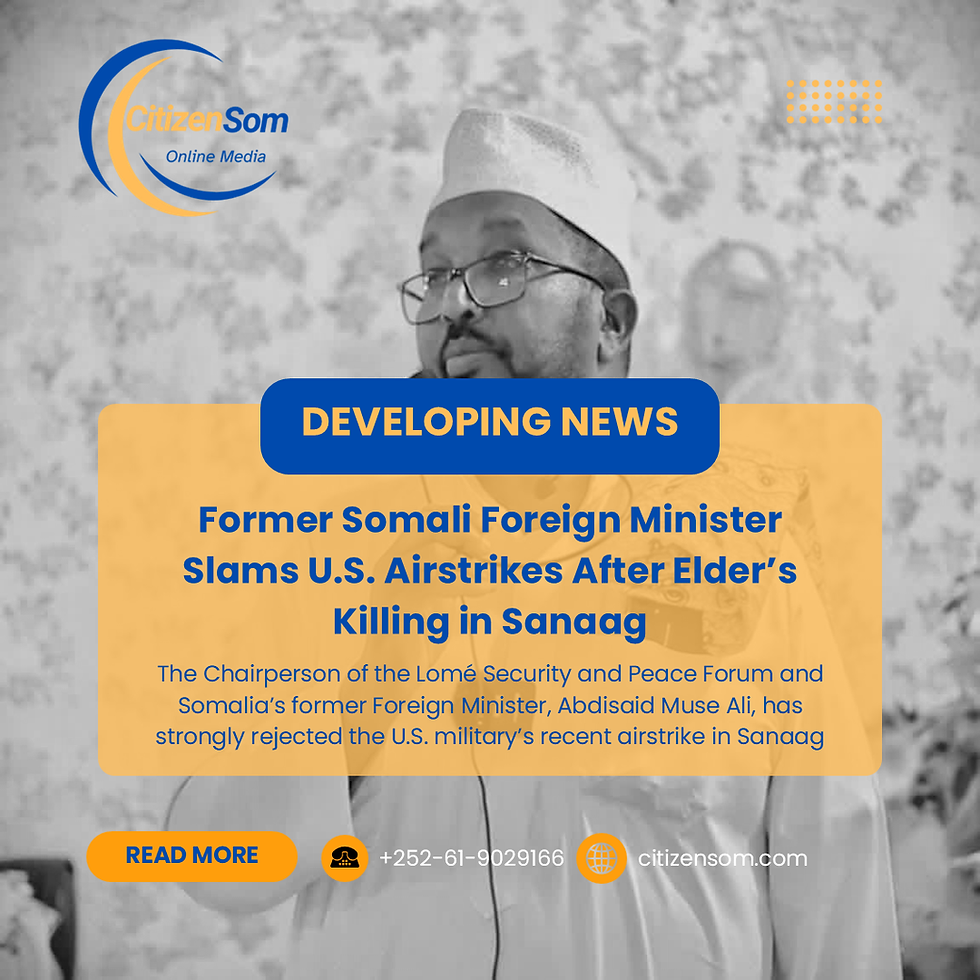Former Somali Foreign Minister Slams U.S. Airstrikes After Elder’s Killing in Sanaag
- NEWSDESK

- Sep 17
- 3 min read
The Chairperson of the Lomé Security and Peace Forum and Somalia’s former Foreign Minister, Abdisaid Muse Ali, has strongly rejected the U.S. military’s recent airstrike in Sanaag, which he says wrongly killed a respected Somali elder and branded him an al-Shabaab militant.

Mogadishu, Sept. 17, 2025– Abdisaid Muse Ali, the 30th Minister of Foreign Affairs and International Cooperation of Somalia, and former National Security Advisor, has issued a strong condemnation of U.S. Africa Command’s (AFRICOM) recent airstrikes in the Sanaag region.
In a statement, Ali said the operation wrongfully targeted a respected Somali elder:
“A respected Somali elder met the President of Puntland at the PMPF compound in Bosaso only a few days ago. This weekend he was killed in an airstrike & branded ‘al Shabaab.’ This is not only false, it is dangerous.”
He stressed that traditional elders are pillars of Somali society.
“Traditional elders are the backbone of Somali society. They mediate disputes, prevent violence, & anchor reconciliation. To strike them with impunity & call them militants is to attack the institutions that hold Somali communities together.”
Ali questioned the reliability of U.S. intelligence assessments that label community figures as militants:
“If an elder can meet a Somali leader in daylight & then be declared a terrorist by nightfall, what message does that send? That no Somali authority or individuals is safe from foreign mislabeling & targeting with impunity! U.S. intelligence has a record of misidentifications in Somalia: weddings, nomadic camps, community figures branded as ‘terrorists.’ Each error destroys lives & erodes trust.”
According to him, the killing of respected elders risks weakening one of Somalia’s most critical forces against extremism:
“Elders restrain al Shabaab precisely because they are not al Shabaab. Killing them removes one of the few forces capable of checking violence & negotiating peace.”
Ali linked such incidents to broader threats against Somalia’s fragile state-building process:
“Somalia’s reconciliation & federal project depends on elders, civil society, & intellectuals. Undermining them undermines the Somali state itself. The FGS & the United States must be held accountable. Somali lives cannot be reduced to ‘enemy combatants’ after the fact and without due process.”
He rejected the normalization of civilian casualties under counterterrorism operations:
“This should never be normalized. Drone strikes that kill elders & then brand them as militants are not routine counterterrorism. They are an assault on Somali society.”
Ali further emphasized the role of community leaders in peacebuilding:
“Elders & business community are not al Shabaab. They are bridges between Somali society & the Somali state. To target them is to undermine the possibility of peace & stability in itself.”
The U.S. military confirmed conducting an airstrike in the vicinity of Badhan, northeast Somalia, on Sept. 13, 2025, targeting what it described as an al-Shabaab weapons dealer. Local reports, however, say the strike killed a respected elder, sparking anger and renewed debate over U.S. counterterrorism operations in Somalia.
Human rights groups and Somali officials have repeatedly raised concerns that drone strikes often misidentify civilians, damaging community trust and complicating local reconciliation efforts.
Ali’s remarks come at a time when Somalia’s federal government is under pressure to strengthen ties with international partners while also addressing public outrage over civilian casualties in counterterrorism campaigns.









Comments